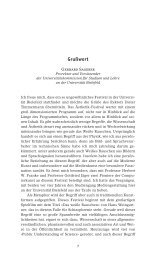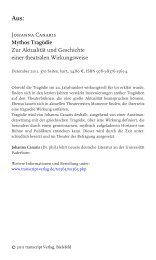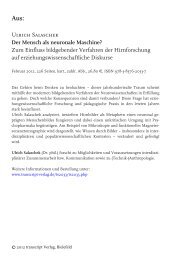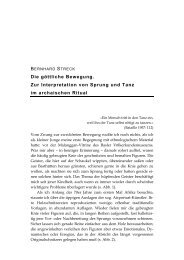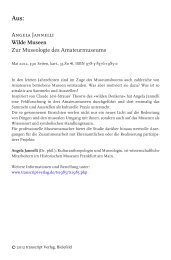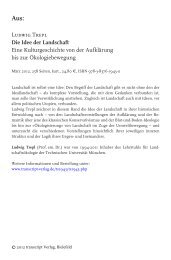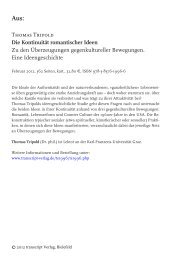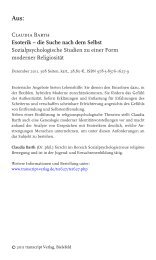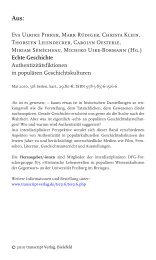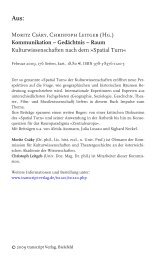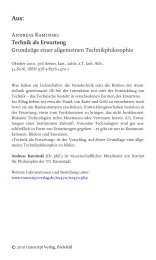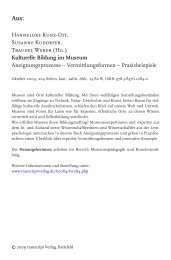Julia Straub (ed.) Paradoxes of Authenticity Studies on a Critical ...
Julia Straub (ed.) Paradoxes of Authenticity Studies on a Critical ...
Julia Straub (ed.) Paradoxes of Authenticity Studies on a Critical ...
You also want an ePaper? Increase the reach of your titles
YUMPU automatically turns print PDFs into web optimized ePapers that Google loves.
22 | JULIA STRAUB<br />
Both Huber and Schönfelder look at texts whose c<strong>on</strong>cern with authenticity<br />
as a narrative mode reaches bey<strong>on</strong>d its referential functi<strong>on</strong>. The<br />
texts they have chosen for analysis focus <strong>on</strong> events that cannot be represent<str<strong>on</strong>g>ed</str<strong>on</strong>g><br />
with the help <str<strong>on</strong>g>of</str<strong>on</strong>g> c<strong>on</strong>venti<strong>on</strong>al language or narrati<strong>on</strong>. Instead,<br />
authenticity is treat<str<strong>on</strong>g>ed</str<strong>on</strong>g> indirectly <strong>on</strong> a meta-level. Here authenticity<br />
manifests itself as a quest for real selfhood and identity, trigger<str<strong>on</strong>g>ed</str<strong>on</strong>g> or<br />
accompani<str<strong>on</strong>g>ed</str<strong>on</strong>g> by traumatic experiences. Irmtraud Huber’s essay examines<br />
J<strong>on</strong>athan Safran Foer’s novel Everything is Illuminat<str<strong>on</strong>g>ed</str<strong>on</strong>g> (2002),<br />
which wraps up its trauma narrative in an unreliable narrative mode.<br />
Huber uses Foer’s well-receiv<str<strong>on</strong>g>ed</str<strong>on</strong>g> and hugely popular novel to propose<br />
a shift away from a romantic view <str<strong>on</strong>g>of</str<strong>on</strong>g> authenticity as something internal<br />
and essential towards the testim<strong>on</strong>ial authentic as the more adequate<br />
form <str<strong>on</strong>g>of</str<strong>on</strong>g> framing authenticity in the twenty-first century. Similarly,<br />
Christa Schönfelder’s essay shows that the authenticity <str<strong>on</strong>g>of</str<strong>on</strong>g> the narrative<br />
act is ti<str<strong>on</strong>g>ed</str<strong>on</strong>g> to the truthfulness <str<strong>on</strong>g>of</str<strong>on</strong>g> the narrating voice: if the integrity<br />
<str<strong>on</strong>g>of</str<strong>on</strong>g> the latter is threaten<str<strong>on</strong>g>ed</str<strong>on</strong>g> by the unreliability <str<strong>on</strong>g>of</str<strong>on</strong>g> memory, caus<str<strong>on</strong>g>ed</str<strong>on</strong>g>,<br />
for example, by childhood trauma, the narrative itself loses its trustworthiness.<br />
The self cannot be true to itself when it has been fragment<str<strong>on</strong>g>ed</str<strong>on</strong>g><br />
by a loss <str<strong>on</strong>g>of</str<strong>on</strong>g> memory. Hence Schönfelder’s discussi<strong>on</strong> <str<strong>on</strong>g>of</str<strong>on</strong>g> several<br />
novels, am<strong>on</strong>g which are Margaret Atwood’s Cat’s Eye and Helen<br />
Dunmore’s Talking to the Dead, hinges up<strong>on</strong> crises <str<strong>on</strong>g>of</str<strong>on</strong>g> authenticity,<br />
which are crises <str<strong>on</strong>g>of</str<strong>on</strong>g> memory and identity.<br />
Authentic Lives<br />
Scott Loren begins his c<strong>on</strong>tributi<strong>on</strong> to this volume by referring to the<br />
phenomen<strong>on</strong> <str<strong>on</strong>g>of</str<strong>on</strong>g> self-help literature. The popularity <str<strong>on</strong>g>of</str<strong>on</strong>g> the example he<br />
menti<strong>on</strong>s, Phillip C. McGraw’s self-help guide Self Matters: Creating<br />
Your Life from the Inside Out (2001), reflects the unbroken human desire<br />
for self-realizati<strong>on</strong> and ‘authenticity.’ As Loren argues, McGraw’s<br />
book, certainly <strong>on</strong>ly <strong>on</strong>e am<strong>on</strong>g many <str<strong>on</strong>g>of</str<strong>on</strong>g> the same kind, proposes an<br />
idealiz<str<strong>on</strong>g>ed</str<strong>on</strong>g> view <str<strong>on</strong>g>of</str<strong>on</strong>g> the liberal humanist self, a self that is characteriz<str<strong>on</strong>g>ed</str<strong>on</strong>g><br />
by its aut<strong>on</strong>omy, its ability for self-reflecti<strong>on</strong> and its capacity to maintain<br />
a culture <str<strong>on</strong>g>of</str<strong>on</strong>g> interiority. It is this kind <str<strong>on</strong>g>of</str<strong>on</strong>g> liberal self that had come<br />
under attack by theorists and philosophers <str<strong>on</strong>g>of</str<strong>on</strong>g> the twentieth century,<br />
and their noti<strong>on</strong>s <str<strong>on</strong>g>of</str<strong>on</strong>g> ‘discourse’ or ‘performativity,’ which have dismantl<str<strong>on</strong>g>ed</str<strong>on</strong>g><br />
essentialist noti<strong>on</strong>s <str<strong>on</strong>g>of</str<strong>on</strong>g> subjectivity ever since. In his essay,



